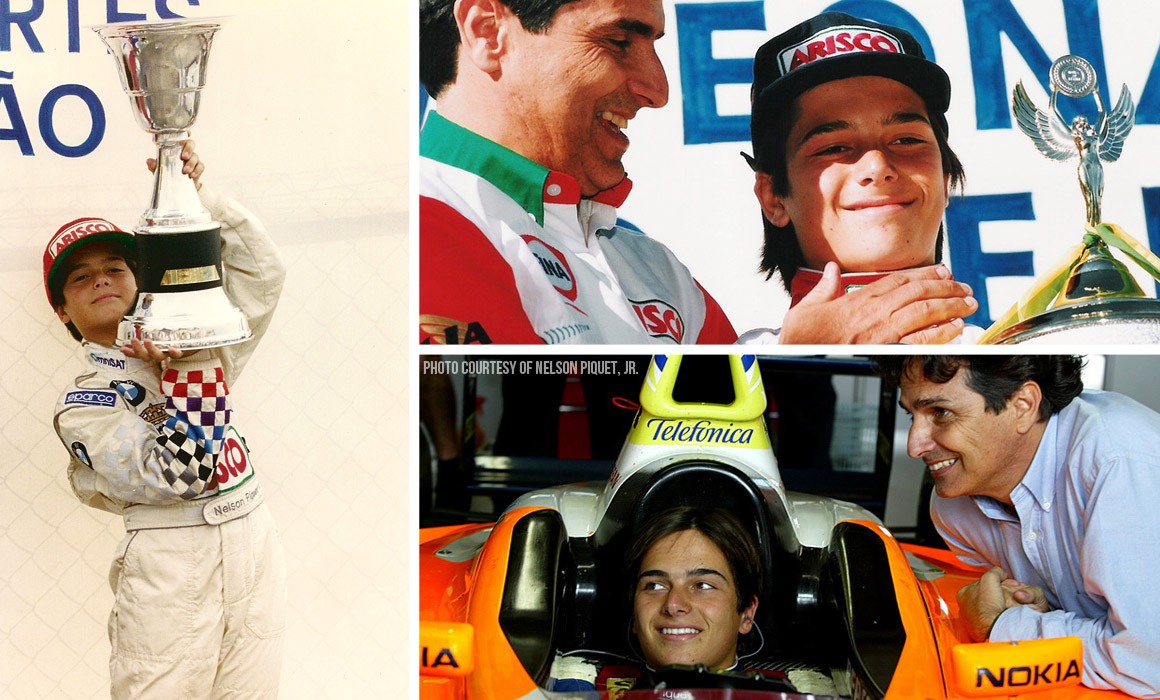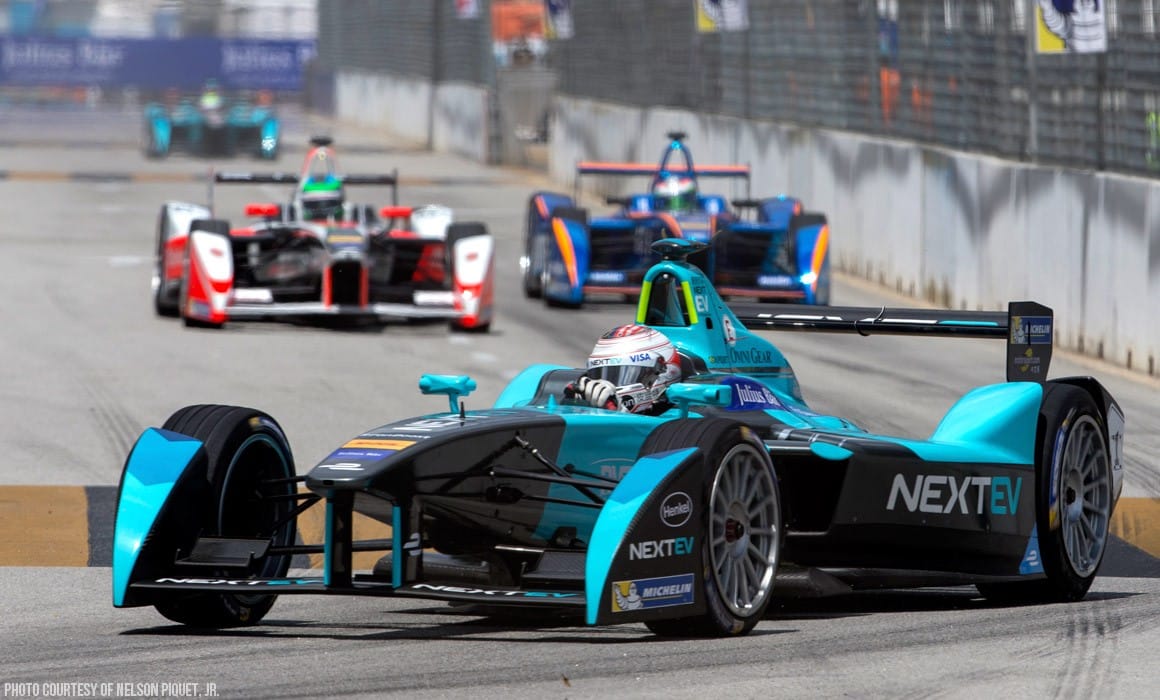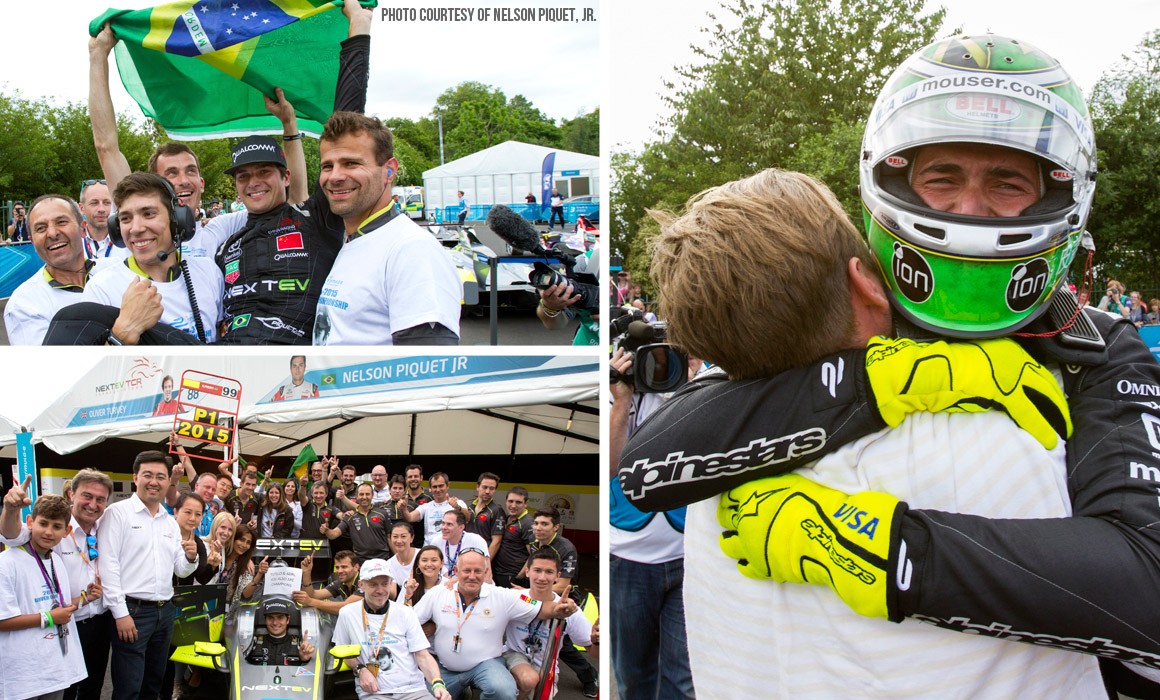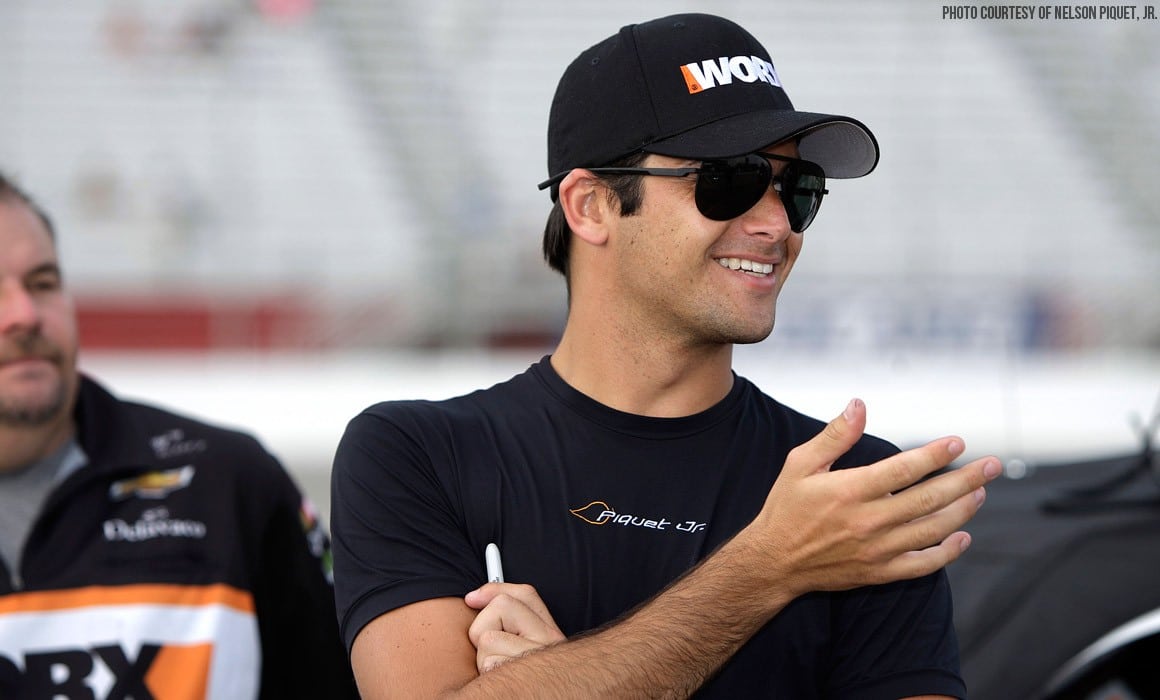Motor racing has official zoomed into a new era. Formula E is quickly becoming the signatory sport that is steering cars onto greener roads. But this bold move comes with the mission to spark innovation among the commercial car industry and further develop electric vehicle technology.
The historic Formula E series kicked off its second season this year, bringing the Grand ePrix races to Long Beach, Calif. where MiLLENNiAL met up with Nelson Piquet, Jr., the 30-year-old Brazilian who famously won the inaugural ePrix Grand Championship in 2015.
The reigning champion, Nelson looked relaxed yet confident as he worked with his NEXTEV team preparing for the big day. Although a massive production was in the midst of setting up the track, quiet excitement lingered in the air as drivers tended to their priorities, tucked in their tents and focused on strategy.
From Go Karts to Formula One and NASCAR
The son of three-time Formula One world champion, Nelson Piquet, Sr., racing is in Nelson’s blood. He started competing with go karts in Brazil when he was eight years old. It was only natural that he would gravitate to the sport and showcase a real talent for driving at such a young age. “Winning races with go karts when you are 13 or 14 years old, you don’t even think about making a career, you just dream about being able to race,” he tells us.
By the time he was 18, Nelson moved to the UK to join the British Formula 3 Championship where he first began to show real promise as a young driver, ending in 3rd place with six wins. The following year, in 2004, he became the youngest winner to take home the British Formula 3 Championship at just 19 years old.
These early career wins put him on the radar of Renault Formula One who offered him a seat on their team during the 2008 season. But the intense league proved to be too much for Nelson as the pressure began to hinder his performance. Race after race, he crashed or retired early, placing him at the back of the pack and disappointing his sponsor.
The Renault team went as far as to suggest that he might have lost confidence, which only fueled Nelson’s determination. “Every race car driver needs to be confident. He needs to know that he is better than the others and that he can be better than the others. That’s what is part of what makes you win.”
It seemed to work at first, extending his contract with the team, but several months later he was let go for failing to recover his losses. In hindsight, leaving the Renault Formula One team was the best thing that could have happened to Nelson. He would go on to diversify his racing career by joining NASCAR’s Camping World Truck Series in 2010.
Immediately in a new driver’s seat, Nelson began significantly improving. And by 2012, he became the first Brazilian to win a NASCAR national touring series. “Everything has to align perfectly for you to keep going up. You need to have the right sponsors, you need to be with the right team, you need to not make any mistakes, everything needs to fit perfectly in order for you to make a career out of racing, which is very difficult.”
Nelson Piquet, Jr. Champions a New Motor Sport Series
Among a new generation of racers, Nelson joined China Racing, a Formula E team sponsored by NEXTEV, in 2014 prior to the start of the series’ inaugural season. Nelson saw Formula E as offering a clean slate for single seat competition, a style he hadn’t competed in since 2009, as well as an opportunity to be part of history.
“We are the pioneers of electric racing,” he says proudly. For the first few years, the Fédération Internationale de l’Automobile (FIA), the governing body of Formula racing, has limited Formula E drivers to one model – the Spark-Renault SRT-01E.
Nelson believes limiting the model of race car put him and his competitors on an even playing field during last year’s season. He tells us it was the first time he was on equal terms with the other drivers. “The tracks were new, the cars were new, and there was a fresh start for everybody.” Being able to race among drivers without a competitive advantage allowed Nelson the opportunity to pull ahead and become victorious in a new division of the sport.
While the car acts as a “vehicle for change,” it’s performance isn’t quite up to Formula One standards. The Formula E car currently reaches 62 mph in three seconds and attains maximum speed at 140 mph. Alejandro Agag, CEO of Formula E, assures Formula One enthusiasts that the new series has no intention of being seen as an alternative competitor, instead it is meant to open up conversation around sustainability and encourage eco-friendly practices throughout all facets of the industry.
However, Formula E still has some kinks to work out if it is to become a popular series. Due to the battery’s current lifespan, the duration of each race – about 40 minutes – is much shorter than what most viewers would prefer causing drivers to change cars in order to keep going.
Sir Richard Branson, who sponsors the DS Virgin Formula E team, admits, “We want our batteries to last at least an hour at full racing speeds…it’s through motor racing like Formula E that these technologies are pushed forward.” Teams are aiming to successfully integrate these changes by 2020.
Another factor viewers are going to have to get over is the lack of noise emitted from the engine. If Formula E is any indication of the future, loud motor racing requiring earplugs will soon become a thing of the past.
Time will show how these cars will evolve, but one thing is for certain, the industry is drawing in electric car giants, Tesla and Faraday Future. Being conscious of where the industry is headed, Nelson smiles and says, “The more racing, the more drivers, the more sponsors the better!”
Looking Back in Order to Move Forward
Carrying the torch for a new era of racing, Nelson also contributes his expertise to kids interested in becoming race car drivers through his go-kart team, Piquet Sports. Part of his coaching includes teaching parents how to navigate the racing world.
He says he often helps guide parents who are overly enthusiastic and eager to spend money on their child’s formidable career. But he insists on reminding them, “What is most important is that your kid loves what they are doing.” Nelson explains that racing can be expensive and children involved should have a burning passion for the sport that is self-initiated and not solely motivated by their parents.
“Racing is my life, it is my career, it is what I love doing,” he says, “[parents] need to learn there are right and wrong times to spend money… go-karting is just the beginning of a career.”
Looking back on his own path he reflects on what he would have done differently. “I would have accelerated my understanding of motor racing a bit more, and worked harder.” He also admits he wasn’t the first to embrace social media when it first came out. “Now a days this is much more of a business than it is a sport.” He emphasizes a racer’s career is largely based on self-branding.
Media and marketing have become two of his interests, and he would consider exploring those fields within motor racing if he were to retire. But with a revolutionary series ahead, he says he also sees an opportunity to eventually manage and position young drivers, helping them to avoid some of his mistakes.
Like most entrepreneurs and young professionals, Nelson’s battle with racing proves that perseverance and determination are the secret sauce to any successful career. Failure can sometimes lead to the biggest wins.
To learn more about Nelson Piquet, Jr. or the Formula E Grand Prix schedule, visit FIA Formula E to see when the race is coming to a city near you.




